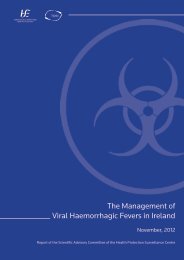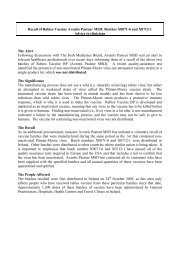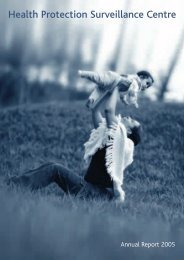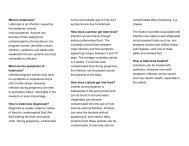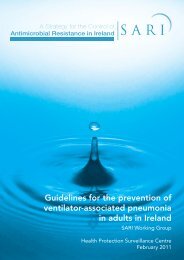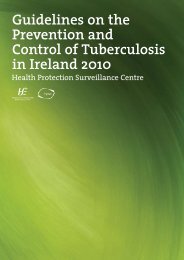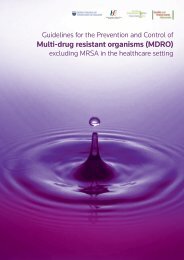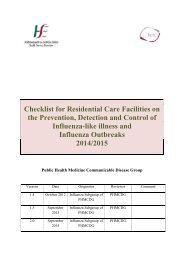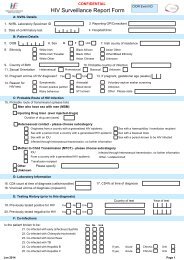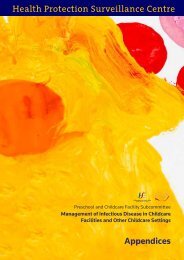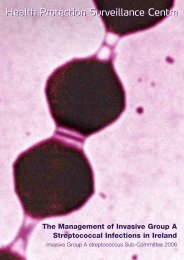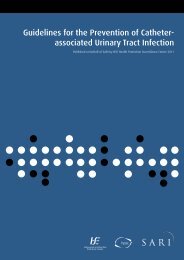Guidelines for the Early Clinical and Public Health Management of ...
Guidelines for the Early Clinical and Public Health Management of ...
Guidelines for the Early Clinical and Public Health Management of ...
Create successful ePaper yourself
Turn your PDF publications into a flip-book with our unique Google optimized e-Paper software.
<strong>Guidelines</strong> <strong>for</strong> <strong>the</strong> <strong>Early</strong> <strong>Clinical</strong> <strong>and</strong> <strong>Public</strong> <strong>Health</strong> <strong>Management</strong> <strong>of</strong> Bacterial Meningitis (including Meningococcal Disease)<br />
12. REASSESS CLINICALLY Monitor blood glucose <strong>and</strong> assess need <strong>for</strong><br />
dextrose<br />
Hypoglycaemia should be treated with 5ml/<br />
kg <strong>of</strong> 10% dextrose solution <strong>and</strong> subsequent<br />
inclusion <strong>of</strong> dextrose in maintenance fluids<br />
Assess K+ needs as soon as U&E results<br />
available<br />
Maintain glucose<br />
≥ lower limit <strong>of</strong> normal, but<br />
< 10 mmol/L.<br />
Maintain K+ within normal<br />
range<br />
13. IF MENINGOCOCCAL INFECTION<br />
SUSPECTED OBTAIN THROAT SWAB<br />
<strong>and</strong>/or PERNASAL SWAB<br />
14. CONSIDER FURTHER<br />
CONSULTATION<br />
For epidemiological purposes<br />
Important as may be only site to yield isolate,<br />
especially, if antibiotics have been given.<br />
Throat swab - a full sweep <strong>of</strong> <strong>the</strong> pharyngeal<br />
wall <strong>and</strong> tonsils, from all patients. If not<br />
possible, obtain a pernasal swab rotated on <strong>the</strong><br />
posterior pharyngeal wall<br />
Microbiology, neurology, nephrology, infectious<br />
diseases input may be helpful. <strong>Early</strong> orthopaedic<br />
input if required (<strong>for</strong> fasciotomy), plastic surgery<br />
if required<br />
Monitor epidemiology<br />
<strong>of</strong> bacterial sepsis <strong>and</strong><br />
meningitis.<br />
Of critical importance in era<br />
<strong>of</strong> introduction <strong>of</strong> ‘meningitis<br />
vaccines’<br />
15. NOTIFY PUBLIC HEALTH AND<br />
INFECTION CONTROL as soon as<br />
possible<br />
Ensure Contact Chemoprophylaxis if<br />
necessary (See Chapter 7, 8, 9, Appendix<br />
4) <strong>and</strong> in<strong>for</strong>mation as per agreed<br />
protocol.<br />
Under <strong>the</strong> statutory Infectious Diseases Regulations 1981, amended 2003, cases<br />
or suspect cases <strong>of</strong> bacterial meningitis or meningococcal septicaemia must<br />
be notified immediately to <strong>the</strong> Department <strong>of</strong> <strong>Public</strong> <strong>Health</strong> (Medical Officer <strong>of</strong><br />
<strong>Health</strong>). Telephone notification should be used initially, as a matter <strong>of</strong> urgency.<br />
This is <strong>the</strong> responsibility <strong>of</strong> <strong>the</strong> admitting team. All telephone notifications must<br />
be followed by written notification.<br />
-27-



